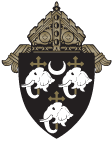Catholics in our area have been hit with some sobering news over the past few months. We are again confronted with the issue of evil in the world, in this case horrific crimes against children by those charged to proclaim the Gospel.
These stories of sin affect all of us, whether or not we, or someone we know, may have been directly victimized. It can cause Catholics to question their faith, and wonder, how can anyone who claims to be a follower of Jesus exploit young people for their own selfish ends?
Baptism, ordination and the other sacraments do not change our nature as human beings. We say we are all sinners and we truly are. Jesus gives us the redeeming grace to resist sin, overcome it, avoid it, but no matter who we are, we have the freedom to reject Jesus’ help.
Sin is always a choosing of the self, a turning inwards, a turning away from God’s will. The temptation of the serpent we read about in Scripture was couched in these terms. If you disobey God, you will be just like God, independent of God and God’s equal. Human beings have not lost that pull towards an autonomy that takes away our dependence on God.
Everyone grapples with this tension to choose between what God wants and what we want. It is very personal, yet also very communal.
We read in the Gospel that Jesus in the Garden said to the Father, not my will but yours be done. That declaration of Jesus brought redemption and salvation for us. When we declare instead, my will, not yours be done, we bring death and destruction to ourselves and those whose lives we touch.
We are a Church that began with the 12 Apostles. One, Judas, betrayed Jesus, another, Peter, called to be the Rock, denied Jesus. Except for John, the others abandoned him.
We are a Church of sinners. Jesus says he came not for the self-righteous, but for sinners. So we have to face that reality. But we keep discovering that it’s a reality, not merely a pious statement. We rightly are horrified when we see those who have been called to shepherd the people of God becoming, instead of good shepherds like Jesus, more like the hirelings that Jesus condemns. We feel betrayed. We are angry. We are disillusioned. For many of us our faith is shaken.
In confronting the problem of evil we have to face two realities:
First, God has created everyone with a free will. Free will is powerful. If I had all of God’s knowledge and his limitless love, I don’t know if I would have given people the freedom to choose to turn away, to choose evil, the self-destructive and the socially destructive actions that create hurt and pain. And yet, with the gift of free will, God has given us a weapon to thwart his plan for us. It began with our first parents and it continues to today. We are free to say no to God, his love and plan for us.
Second, along with free will, there is sin and evil in the world. Scripture reminds us that sin takes us away from God and towards self, creating chaos, pain and far-reaching effects that go beyond the sinner.
How do we cope? How do we overcome the anger and disillusionment?
Our faith has to be in, and should be above all, in the person of Jesus. It is only because we believe in and trust Jesus that we can say that we believe in one, holy, Catholic and apostolic church.
What we are experiencing is the reality that sin unbalances the moral order. It is a bitter lesson. Sin is not merely private or personal, it is always social.
How can we make the Church better?
All the baptized have to assume responsibility for its life. Everyone has a duty because, through our baptism, we all have a relationship with Jesus.
We must be truth-tellers. We must tell the truth in love as Jesus did. We have been called, especially in the documents of Vatican Council II, to take an active and responsible role in the life of the Church. This is not new. If we read the Acts of the Apostles and the early Church Fathers, we see a community of faith that took responsibility. So we are called like those who went before us.
All of us together have to work at becoming the Kingdom of God. We can’t be spectators. We can no longer be passive.
Certainly the liturgical renewal after Vatican II shows us that we are participants in the most sacred act of worship. But that participation is not only reserved for participation in the Eucharist. We have to call one another to fidelity, to humility.
Those of us who are ordained have to be reminded that we have been called to serve, not to be served. We are called to proclaim the Good News not only in word but in the example of our lives. I need to be corrected when I forget in my human weakness what I am called to be. We are called to correct one another in truth and to assist one another to live the Gospel.
The Church has been wounded by the sin of those who are called to shepherd and to sanctify. The Church will only be healed through God’s grace, by all of us who are called to follow Jesus, the Way, the Truth and the Light.
